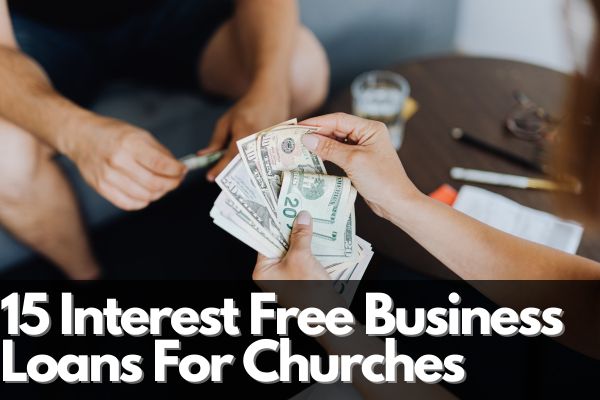As non-profit organizations, churches often require funding for their various activities and projects. Interest-free business loans can provide an excellent solution for churches looking to fund their operations without accruing significant debt.
This article will explore 15 interest free business loans for churches, including microloans, equipment loans, lines of credit, SBA loans, angel investors, and crowdfunding.
We will provide a detailed overview of each loan, including eligibility requirements and application processes, to help churches decide on financing options.
Discover the best interest-free business loans available for your organization if you’re looking for ways to fund your church’s activities without incurring debt.
Contents
15 Interest Free Business Loans For Churches
1. Microloans
Microloans are small loans typically provided by non-profit organizations and government agencies to support small businesses and non-profit organizations.
These loans usually have lower interest rates and flexible repayment terms, making them an excellent option for churches.
2. Equipment Loans
Churches may need to purchase equipment such as musical instruments, sound systems, or computers for their services and events.
Equipment loans can be used to finance these purchases, typically with interest-free repayment terms.
3. Line Of Credit
A line of credit is a flexible form of financing that allows churches to borrow funds up to a predetermined credit limit as needed.
The interest is only charged on the amount borrowed, and churches can repay the loan interest-free during the repayment period.
4. SBA Loans
The Small Business Administration (SBA) provides loans to non-profit organizations, including churches.
These loans come with low-interest rates and can be used for a range of purposes, including expansion projects, equipment purchases, and operating expenses.
5. Angel Investors
Angel investors are individuals who provide capital to businesses and non-profit organizations. These investors often provide interest-free loans in exchange for a share of ownership in the organization.
6. Crowdfunding
Crowdfunding involves raising funds from a large group of people, often through online platforms. Churches can use crowdfunding to finance specific projects or events.
7. Friends And Family Loans
Friends and family loans involve borrowing funds from individuals close to the organization. These loans often come with no interest or low-interest rates and can be a great option for churches.
8. Grants
Grants are funds provided by government agencies, foundations, and other organizations to support specific causes or projects. Churches may be eligible for various grants, including those that provide interest-free funding.
9. Community Development Financial Institutions (CDFIs)
CDFIs are non-profit organizations that provide financial services to low-income communities. These organizations offer interest-free loans to non-profit organizations, including churches.
10. Church Lending Institutions
Some financial institutions specialize in providing loans to churches and other religious organizations. These institutions may offer interest-free financing options.
11. Peer-To-Peer Lending
Peer-to-peer lending involves borrowing funds from individuals, often through online platforms. These loans typically have lower interest rates than traditional loans and may be interest-free.
12. Credit Unions
Credit unions are non-profit financial institutions that offer their members loans and other financial services.
Some credit unions may offer interest-free loans to churches and other non-profit organizations.
13. Church Bonds
Church bonds involve borrowing funds from investors in exchange for a fixed return on investment over a set period. These bonds may be interest-free, depending on the terms of the agreement.
14. Government Grants
Governments at the federal, state, and local levels often provide grants to non-profit organizations, including churches. These grants may offer interest-free financing options.
15. Church Affiliates
Some churches have affiliate organizations that provide interest-free loans to other churches and non-profit organizations in the same denomination. These loans may have flexible repayment terms and lower interest rates.
What Is Interest-Free Business Loans?
An interest-free business loan is a type of loan in which the borrower is not required to pay any interest on the principal amount borrowed.
This means the borrower is only required to repay the principal amount borrowed without any additional interest charges.
Interest-free business loans are often provided by non-profit organizations, government agencies, and other entities that aim to support businesses and organizations needing funding.
These loans can benefit businesses and organizations that require financing but want to avoid the additional cost of interest charges, which can add up over time and increase the overall cost of borrowing.
Importance Of Business Loans For Churches
1. Fund Church Expansion
Business loans can be used to fund church expansion projects, such as constructing new buildings, renovating existing structures, or acquiring additional land.
2. Cover Operating Expenses
Business loans can help churches cover their operating expenses, such as salaries, utility bills, and maintenance costs.
3. Purchase Equipment
Churches may need to purchase equipment, such as sound systems or projectors, for their services and events. Business loans can help finance these purchases.
4. Host Community Events
Churches often host community events, such as food drives, festivals, and seminars. Business loans can help fund these events, which can benefit the wider community.
5. Support Missionary Work
Churches may use business loans to support their missionary work, including funding overseas trips and supporting missionaries who work in remote areas.
6. Create Employment Opportunities
Business loans can help churches create employment opportunities, such as hiring staff for administrative, technical, or other roles.
7. Respond To Emergencies
Business loans can help churches respond to emergencies, such as natural disasters, by providing the necessary funds to repair damaged buildings and equipment.
8. Provide Financial Stability
Business loans can provide financial stability for churches, ensuring that they can continue to carry out their work and fulfill their mission over the long term.
9. Generate Income
Churches may use business loans to start income-generating projects, such as running a bookstore or coffee shop, to supplement their income.
10. Build Credit
Timely repayment of business loans can help churches build credit, which can make it easier for them to access financing in the future.
Eligibility Requirements For Interest Free Business Loans For Churches
The eligibility requirements for interest-free business loans for churches may vary depending on the lending institution or organization providing the loan.
However, some common eligibility requirements include the following:
1. Non-Profit Status
Churches must be registered as non-profit organizations with the appropriate government agencies and must provide proof of their non-profit status.
2. Length Of Operation
Churches must have been in operation for a minimum period, typically one or two years, to demonstrate financial stability and a track record of responsible financial management.
3. Creditworthiness
Churches must have a good credit history and demonstrate their ability to repay the loan on time. This may involve submitting financial statements, tax returns, and other documentation.
4. Purpose Of The Loan
Churches must demonstrate a clear purpose for the loan, such as financing a specific project, covering operating expenses, or purchasing equipment.
5. Collateral
Some lenders may require collateral, such as property or other assets, to secure the loan.
6. Personal Guarantees
Some lenders may require personal guarantees from the church’s leadership, such as the pastor or board members, to repay the loan.
7. Compliance With Legal Requirements
Churches must comply with all applicable laws and regulations related to non-profit organizations, including fundraising, taxes, and reporting.
It is important for churches to carefully review the eligibility requirements of any lender or organization offering interest-free business loans to ensure they meet the qualifications before applying for the loan.
Factors To Consider When Choosing The Right Loan
When choosing the right loan for a church, several factors should be considered to ensure the loan meets the organization’s financial needs and goals.
Some key factors to consider include:
1. Interest Rates And Fees
Churches should compare interest rates and fees from different lenders to ensure they are getting the best deal.
Interest-free loans may be the best option for churches that want to avoid paying interest charges altogether.
2. Loan Terms And Repayment Options
Churches should consider the loan terms and repayment options, including the length of the loan, the repayment schedule, and any penalties for early repayment.
Loan terms should align with the church’s financial goals, and repayment options should be flexible to accommodate changes in the organization’s financial situation.
3. Loan Amount
Churches should consider the amount of money they need to borrow and ensure the loan amount is sufficient to cover their financial needs.
Borrowing too much can lead to unnecessary debt, while borrowing too little can limit the organization’s ability to achieve its goals.
4. Eligibility Requirements
Churches should review the eligibility requirements for each loan option to ensure they qualify.
Eligibility requirements may vary depending on the lender, so it’s important to understand them before applying.
5. Repayment History
Churches should consider their past repayment history and whether they have a good credit score.
Lenders may be more willing to offer loans to organizations with a good track record of repaying their debts.
6. Purpose Of The Loan
Churches should consider the purpose of the loan and ensure it aligns with their financial goals.
For example, if the loan is for an expansion project, the organization should ensure a clear plan for how the project will generate revenue to repay the loan.
Conclusion
Interest-free business loans for churches can be a great way to help non-profit organizations achieve their financial goals without incurring high-interest charges.
When choosing the right loan, it’s important for churches to consider factors such as interest rates and fees, loan terms and repayment options, loan amount, eligibility requirements, repayment history, and the purpose of the loan.
By carefully considering these factors and researching different loan options, churches can find the right loan that meets their financial needs and helps them achieve their goals.
If your church is considering applying for an interest-free business loan, be sure to do your research and work with a reputable lender or organization to ensure a smooth and successful borrowing experience.







